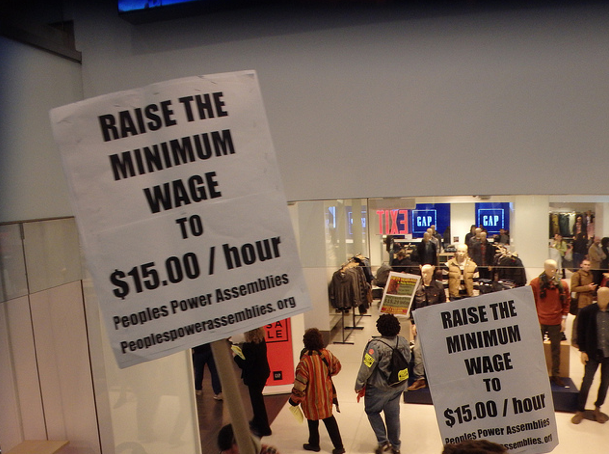She’s a socialist, and she’s actually made it pretty far in this nation’s political arena.
That’s right. A socialist won her election for Seattle City Council. This was in November of 2013, and since then, Kshama Sawant has notched a few more victories.
A little over a week ago, Seattle’s City Council unanimously approved raising the legal minimum wage within city limits to fifteen dollars. For reference, the federal minimum wage is just over seven dollars, making Seattle’s new standard more than double.
Sawant is an economics professor at a Seattle Community College who has made it her singular political mission to raise the minimum wage to fifteen dollars across the country, in major cities and small cities, on the east coast and the west coast, in red states and blue states alike. She’s started an online campaign – 15now.org – to bank on young enthusiasm for the decidedly leftist approach to improving our national economic health.
But whether raising the minimum wage to fifteen dollars will pump billions of dollars into the economy and improve workers’ quality of life is unclear.
Tom Douglas, a celebrity chef based of Seattle, fears the fifteen dollar minimum wage will price him out from operating a profitable business.
“That is a $5 million+ direct price hike annually on our menus and consequently to our customers. That is more than double our bottom line before taxes and reinvestment. In other words there is no way for us to absorb this expense in-house… This price increase is hugely inflationary to the restaurant business and is irresponsible when considering business people who have long-term leases and investments based on prior economic models.”
Nick Hanauer, a multimillionaire venture capitalist living in Seattle, is one of the city’s strongest supporters of the new fifteen-dollar minimum wage.
“No one earning the current minimum wage of about $15,000 per year can aspire to live decently, much less raise a family. As a result, almost all workers subsisting on those low earnings need panoply of taxpayer-supported benefits, including the earned income tax credit, food stamps, Medicaid or housing subsidies. According to the Congressional Budget Office, the federal government spent $316 billion on programs designed to help the poor in 2012. That means the current $7.25 minimum wage forces taxpayers to subsidize Wal-Mart Stores Inc. and other large employers, effectively socializing their labor costs. This is great for Wal-Mart and its shareholders, but terrible for America. It is both unjust and inefficient.“
Economic researchers have found evidence for both sides of the argument. Some say that increasing the minimum wage will give a boost to the economy through the increased purchasing power of citizens.
“The economy overall will benefit from the gains in equality tied to the minimum wage increase and related policy initiatives. Greater equality means working people have more spending power, which in turn supports greater overall demand in the economy. Greater equality also means less money is available to flow into the types of hyper-speculative financial practices that led to the 2008-09 Wall Street crash and subsequent Great Recession.“ (Albelda, et al.)
Other economists have suggested that raising the minimum wage will have no discernable effect on the quality of life of those receiving the wages. Further, increasing wages might even put the economy into an increasing price spiral that will ultimately leave the wage workers worse off than before.
“One plausible explanation for these findings is that employers (and workers) respond on multiple fronts to any increase in the minimum wage. Individual establishments will follow different paths that depend on a complex set of circumstances that economists operating with what is, even in the best of circumstances, a limited set of data cannot fully capture or explain. Some employers may cut hours; others, fringe benefits; still others, the wages of highly paid workers. Some employers may raise prices (particularly if their competitors are experiencing similar cost increases in response to the minimum wage).” (Schmitt)
Seattle will adopt the wage increase over the coming year. Non-compliant businesses will face penalties if they do not meet the timeline for implementation.
photo cred: All-Nite Media via photopin cc









